#equalities act 2010
Text
i HATE rishi sunak. he has planned a review of the Equality Act 2010, in reference to where transgender people’s right are (currently legislation protects trans people regardless of where they are in the process of transitioning i.e. no matter if they have had surgery, hormones, a gender recognition certificate) which means that self-identification for trans people will have no legal force and so cannot access single-sex spaces they need so urgently like refugee. It’s absolutely horrific. And on top of that people think he also wants parents to have more say on what is taught in PSHCE, so to not allow ‘contentious’ resources about race or LGBTQ+ rights.
This is not OK. TRANS RIGHTS ARE HUMAN RIGHTS
#lgbtqia#queer#transgender#equalities act 2010#rishi sunak#fuck the tories#i hate this government#trans rights are human rights
14 notes
·
View notes
Text

TRIGGER WARNING ⚠️ sensitive topics covered as well as references to self harm.
I was moved to my present address for my safety after being stalked, harassed and assaulted by a council tenant.
The police did nothing after I reported him beyond a virtual slap on the wrist by a PCSO (and people wonder why women don’t report these crimes) and the council did equally nothing to safeguard me.
It took two years to get me moved and only after I went to the government ombudsman, and revealed to my housing officer I was a rape survivor, was anything finally done.
A council manger, Paul Hadley (since retired I’ve been informed) said to me that it was my fault, that I must have been doing something to encourage him and in front of an antisocial behaviour officer present that the council were “not responsible for their tenants behaviour” and proceeded to deny me any safeguarding.
More complaints and ombudsman interventions would follow. Battle for equality rights never ends if you’re a women and happen to also have disabilities.
In the two years it took to get me moved I’d been in A&E as a suicide risk and was regularly self harming. My disabilities worsened and I ended up needing crutches as the pain intensified. My hips now “pop” regularly and I have permanent back pain after living through that ordeal.
After the ombudsman intervention I was given priority status to move. That came with more hurdles and barriers. Paul Hadley, again said I would get this property over his dead body. Somerset Council were consistently unprofessional, in breach of their duty of care and left me at risk consistently.
The housing officer I’d shared my rape experience with got me this home but they placed their own employment at risk to do it and said she would be paying for it for the rest of her time there. Being close to retirement I don’t think she cared what they thought of her any longer, she was an exceptional exception to an otherwise toxic council mentality towards tenants.
It shouldn’t need an employee to put their job in jeopardy to do what the law already specifies is their duty and role as a public service.
When I viewed my current home it was in awful condition and wasn’t accessible. I asked what work was being done to address this prior to my moving here and was advised nothing beyond pre-scheduled works example updating the boiler (which turned out to be faulty from day one). Beyond a decorating kit which I couldn’t safely use I was told repeatedly I could “always self fund” despite this being a provision under law and they had specific disability grants available for the works I was asking for, they refused me all accessibility and refused me an occupational assessment.
Whilst I was safe from one danger by moving here, the stalker, I was thrown into a new set of dangers to my health and safety.
As a vulnerable disabled person I was subject to bullying and harassment from neighbours very early on as they felt I was too young to be living in a bungalow without ever knowing, or caring about the context of my disabilities and what I was moved from.
One case of neighbour harassment became so extreme it ended in a protection order on their visitor.
The property, as already stated was in a terrible state. I photographed it all and sent it to legal counsel. They advised me not to move in (too late by this point) because it was not fit for human habitation and not up to council relet standards.
It took seven years to get the kitchen accessible and it’s still not 100% with faults from installation causing me undue resistance on my joints and risk of injury. I continue to battle that out with the council. It took going to the ombudsman again and the then CEO of the council to even get the kitchen adjusted under equality law.
The boiler has been faulty from day one. It has always done this thing where the pressure builds up and it eventually “burbs”. It’s so bad it sounds like it’s going to blow the cupboard door off. Eventually it started failing and I repeatedly needed to get out of hours engineers from the council to patch it up.
One year it was failing daily and I kept reporting it. The engineers kept having issue scanning the gas meter to log the call. They had a new system and it was having teething issues. This meant that every engineer would not have record of the previous days call out and openly treated me as a liar. Thankfully I had all the email communication to the gas repairs department and was able to prove this was a persistent problem.
During this time I was loosing mobility and dexterity in my joints, notably my hands and fingers. This meant I couldn’t keep myself safe. I was paying extra home help just to be safe, prep more meals and washing up as I couldn’t do anything myself (the kettle had to be repeatedly boiled as I had no hot water during all this).
I was huddled up in my bedroom trying to keep warm. As has been consistent with this council there was no safeguarding and no assistance. After almost a week of this and getting more & more unwell, I filed a formal complaint. I was given a tiny little heater and eventually compensated for the additional electric I was using as well as hourly cost of extra home help.
Since then it has failed again and again. In fact I dread every winter knowing it is going to fail.
Each and every time my mobility is materially impacted, because it usually fails overnight, meaning it’s had 8 hours for the temperature to plummet then hours more before an engineer can come out to patch it up.
In that time I loose mobility and dexterity. It happened again recently (dropping to 14°C by the time I woke to discover the boiler fault) and despite using electric heaters I simply could not warm up. Electric heaters are no substitute for central heating. It left me unable to make a meal and I was unable to get emergency home help to plug the care gap.
One engineer advised me that as long as they have parts they will patch it up indefinitely until it fails permanently. This is without any risk assessment to someone like myself materially impacted by temperature.
I filed another complaint upon many complaints at this point, with the council and they are refusing me a boiler update.
They’re refusing me a risk assessment and refusing me an occupational assessment whilst being fully informed this is having a detrimental impact on my health and safety.
It got so bad that I started to have intrusive thoughts and ended up on the phone to crisis. After an hour with them they were able to stabilise me. I then sought legal advise and as will come as no surprise was informed yes the council are in breach of equalities law but also they’re discriminating me on disabilities ground by refusing a risk assessment of my needs. The council have openly stated that I am getting “special treatment” any time works are carried out even though it ALWAYS falls under equalities/reasonable adjustments.
I even wrote to Duncan Sharkey, the CEO of Somerset Council. I got a short response from a different department repeating the deadlock to upgrading the boiler, refusing me equal access to refuse & recycling collection (thats a whole other story of discrimination over almost a decade) and telling me to take it up with the ombudsman.
So here we go again, I now need to go back to the ombudsman but this time I am looking at legal options (I even took out extra home insurance knowing this would happen) as well as taking this to the national press is my next step. Enough is enough!
Ultimately this goes beyond a boiler, beyond me as one person. This is about an institutional failing towards disabled people and a toxic mentality of blaming tenants when the council don’t want to spend money to carry out their legal duty. They hide behind policy and procedure to deny you equal access and place wilful barriers to health & safety by denying risk assessments.
I once had a council surveyor blame the damp in my previous home on my cats “heavy breathing”, telling me to get rid of the cats and in his report blamed me for not using the extractor fan. There was no extractor fan. Can you guess, yes the council had refused me an extractor fan in that property, but still the council blame the tenant for their failures. As an aside the damp was so severe along the entire block that the wall was collapsing in one property and they had to be relocated for their safety.
But yeah, blame the tenant, it’s Somerset Councils continued consistency, blame the tenant and discriminate, all to save a few pennies whilst taking rent money from us all.
Rouge landlords are not consigned to the private sector!
#disability#discrimination#ehlers danlos syndrome#hEDS#Somerset council#gender discrimination#equality#equity#health and safety#equality act#mobilty#faulty boiler#damp#mould#rougue landlords#damp and mould#government#ombudsman#legal action#equality act 2010#Equalities Act 2010#anti-discrimination law#mental health#uk politics#local government
0 notes
Text
The truly sad thing is that TRAs are not going to take a moment for self reflection and look at the perverts that have overun the TQ+ movement. Instead they are going to lash out at "TERFs".
Judges have ruled that the UK government acted lawfully in blocking Scotland's gender self-ID reforms.
Legislation making it easier for people to change their legally-recognised sex was passed by the Scottish Parliament last year.
The UK government blocked it from becoming law over fears it would impact on equality laws across Great Britain.
The Court of Session in Edinburgh has now rejected a Scottish government legal challenge to the veto.
The Scottish government has 21 days to decide whether it wants to appeal against the ruling, and the case could ultimately end up in the Supreme Court in London.
The legislation received cross-party support in Holyrood, passing by 86 votes to 39 after a highly-charged debate.
Campaigners against the reforms warned the legislation could risk the safety of women and girls in same-sex spaces such as hospital wards and refuges.
Supporters argued it would make the process of obtaining a gender recognition certificate (GRC) easier and less traumatic for trans people.
The legislation would remove the need for trans people to be diagnosed with gender dysphoria by a doctor before they are allowed to change their legally-recognised sex in Scotland, and would lower the age that someone can apply for a GRC from 18 to 16.
The period in which applicants would need to have lived in their acquired gender would be cut from two years to three months.
The UK government stepped in to block the bill from receiving royal assent after it was passed by MSPs, using powers contained in section 35 of the Scotland Act for the first time.
Scottish Secretary Alister Jack raised concerns that the reforms could adversely impact on the 2010 Equality Act, which applies in Scotland, England and Wales and sets out protections for groups including women and transgender people.

The Scottish government challenged the move at the Court of Session - Scotland's highest civil court - with its top law officer, Lord Advocate Dorothy Bain, arguing that Mr Jack did not have "reasonable grounds" to block the bill.
Ms Bain also claimed that if the UK government was successful, Westminster "could veto practically any act of the Scottish Parliament having an impact on reserved matters because he disagreed with it on policy grounds".
But in her written ruling, judge Lady Haldane dismissed the Scottish government's appeal and said the block on the legislation was lawful.
She said Mr Jack followed correct legal procedures when he made his decision to invoke section 35 and that the Scottish government had failed to show that he had made legal errors.
The judge wrote: "I cannot conclude that he (Mr Jack) failed in his duty to take such steps as were reasonable in all the circumstances to acquaint himself with material sufficient to permit him to reach the decision that he did."
Lady Haldane also said that "Section 35 does not, in and of itself, impact on the separation of powers or other fundamental constitutional principle. Rather it is itself part of the constitutional framework."
Welcoming the judgement, Mr Jack said it "upholds my decision to prevent the Scottish government's gender recognition legislation from becoming law".
He added: "I was clear that this legislation would have had adverse effects on the operation of the law as it applies to reserved matters, including on important Great Britain-wide equality protections.
"Following this latest court defeat for the Scottish government, their ministers need to stop wasting taxpayers' money pursuing needless legal action and focus on the real issues which matter to people in Scotland - such as growing the economy and cutting waiting lists."

Alister Jack blocked the legislation because of its potential impact on equalities law that applies across Scotland, England and Wales
Humza Yousaf decided to proceed with the legal challenge shortly after succeeding Nicola Sturgeon - a passionate supporter of trans rights - as first minister earlier this year.
Writing on X, formerly Twitter, he described the ruling as a "dark day for devolution".
Mr Yousaf said: "Today's judgment confirms beyond doubt that devolution is fundamentally flawed. The court has confirmed that legislation passed by a majority in Holyrood can be struck down by Westminster.
"The only way to guarantee we get true self-government is through independence. Sovereignty should lie with the people of Scotland, not a Westminster government we didn't vote for with the ability to overrule our laws."
He was the only one of the three candidates in the SNP leadership contest who backed taking legal action and the issue has been deeply divisive within the party.
Colin Macfarlane, director of nations at LGBTQ+ charity Stonewall, said the ruling would "mean more uncertainty for trans people in Scotland who will be waiting once again to see whether they will be able to have their gender legally recognised through a process that is in line with leading nations like Ireland, Canada and New Zealand."
Labour's shadow Scottish secretary Ian Murray said it was "disappointing this legalisation ended in the courts but this ruling should be respected".
Shortly after the reforms were passed, double rapist Isla Bryson - who changed gender after being arrested for attacking two women - was remanded to a women's jail.
Bryson was subsequently moved to a male prison after the case sparked widespread anger. The Scottish government said the new legislation had no impact on the decision about where Bryson was held.
As befitting an unprecedented case, this is in Lady Haldane's words a "novel and complex" ruling.
She actually concluded in part that this is a situation where many decisions could have been taken, and that "there is possibly no single right answer" - but that the courts should only intervene in the case of a clear error in law.
The judge concluded that Alister Jack was entitled to make a decision on this, and that he had taken the proper steps to come to a view, without going into the even knottier territory of whether it was the right one.
All of that complexity means there could be room for appeal.
The Scottish government will be combing through the ruling to see if there are grounds to go back to court.
Mr Jack has urged them not to, telling them not to waste public funds on further legal action.
But ministers will perhaps put more weight on the position of the Scottish Greens, their partners in government, who are absolutely furious about the "horrible, heartbreaking and unjust" outcome.
Challenging UK ministers on this has been a red line for the Greens in the past. It may be that Scottish ministers have little choice but to fight on if they are to keep their partnership government together.
#UK#scotland#Gender self ID laws#Court of Session in Edinburgh#TRAs want to make it easier for people as young as 16 to legally change their gender#The time spent being required to socially transition first would be reduced from 2 years to a mere three months#Three months would be a honeymoon period#2010 Equality Act
31 notes
·
View notes
Text
U.N. Declaration of Human Rights
by
Ryan Clement
TODAY, 10 December 2023, marks the 75th anniversary of the United Nations Declaration of Human Rights, which came into force in 1948, being just 3 years after the end of World War II.
The Declaration provides that, as human beings, we are entitled to stipulated basic rights regardless of race, colour, religion, sex, language, political or other opinion, national or social…
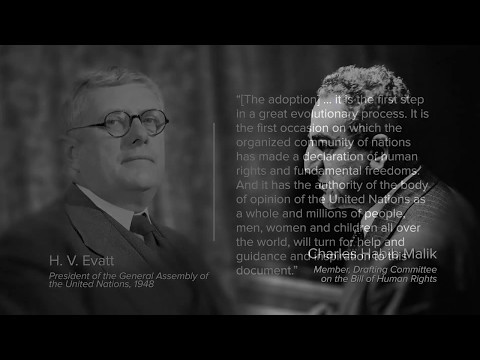
View On WordPress
#Discrimination#Equality Act 2010#European Convention on Human Rights#Human Rights#The Convention for the Protection of Human Rights and Fundamental Freedoms#UN Declaration of Human Rights
5 notes
·
View notes
Text
If you’re in the UK please consider signing this petition.
While the UK Government have responded to this saying changes to the Equality Act are not necessary, yesterday it was revealed they have sought advice from the Equality and Human Rights Commission on implementing the very change this petition is against and that the UK Government said there is no need to do.
14 notes
·
View notes
Text
5 notes
·
View notes
Text
she reads statutes as a hobby
3 notes
·
View notes
Text
The UK is being fucking stupid again...


7 notes
·
View notes
Text
I saw this utterly baffling tiktok that was like “blue haired they/thems are ruining the queer community and alt fashion” and the comments were full of ppl agreeing and being like “yeah I don’t wanna even wear piercings or dye my hair anymore bc I don’t want people to think I’m one of them.” I just like don’t understand HOW bootlicking bitches like that exist.
Like, these must be the high school bullies who attacked all the queer and neurodivergent kids bc they were heavily closeter, and they STILL haven’t learned how to Not completely dehumanize others over harmless shit. I swear its a gross defense mechanism, where people just easily internalize the hatred they see spewed at the community and desperately need to seperate themselves from it and put themselves above others.
And like I say that because I’VE done that, I can be pretty judgemental and easily get the ick over simple things like other ppls interests, style or small behaviors… but I also like lol am self aware enough to recognize that I’m often just being petty or projecting insecurity about my own “weird” or undesirable traits… and I also am not an absolute fucking prick who acts like people I don’t really like or find cringey are subhuman and somehow harming me or my community.
Like genuinely what the fuck do these people think is so bad about Blue Hair Nonbinary whatever the fuck? Like oh what people won’t “take the community seriously” because their entire experience as queer people isn’t centered around misery and wishing they were cishet? Like people can transition and change their names and pronouns but you draw the line when its weird ones you don’t like? Cishets will notttt pick you lol, no matter how you try to pick apart and generalize other people based on how they appear and seperate yourself from them, cishets will use you to project further violence against the entire community and then eat you up too.
And my GOD, those weird and annoying queer people paved the way for the rest of you fuckers. Those fearless alt bisexual girls and flamboyent gay boys and Nonbinary Blue Haired SJWs who came out and fought for themselves first in your middle/high schools and are always the first to challenge the general homophobic and transphobic sentiments of the entire group/generation… just for these bland ass wannabe assimilating gays to be like “ew they’re RUINING the community.” Actually die
#I guess i get kind of personally irritated about this because like. even though i was a quiet kid and not super loud and outspoken and#*weird* in that way. i WAS insufferable in the SJW blue hair kid way. but I was RIGHT and everyone ignored my passion for equality and#facing injustice and shit bc they just werent super on board with it yet. and NOW all the ppl who never had my back then are like oh yeah#im an ally i support nb lgbt blm whatever and its like great. took you long enough to get to that point#while i was the ‘too extreme’ liberal kid (which lol when i look back at those posts now im like way farther left now) but now ppl finally#have realized in the post trump and post pandemic era that shit is Bad#like ppl acting like Trans Nb people just suddenly popped into existance after the pandemic… or like thats when BLM started. like no yall#just werent there with us and were indifferent when all that shit REALLY started around the early 2010s
2 notes
·
View notes
Text
I am exactly the kind of person who would respond to someone questioning me calling myself disabled with "Well, according to the Equality Act 2010-" and I am okay with that
#me#if you're curious#according to the Equality Act 2010#disabled = having a physical or mental impairment that has a substantial and long-term negative effect on your day-to-day functioning#''substantial'' meaning Not Minor Or Trivial so just. struggling.#and ''long-term'' meaning lasting/will last 12+ months
3 notes
·
View notes
Text
Women's Not So Distant History
This #WomensHistoryMonth, let's not forget how many of our rights were only won in recent decades, and weren’t acquired by asking nicely and waiting. We need to fight for our rights. Here's are a few examples:

📍 Before 1974's Fair Credit Opportunity Act made it illegal for financial institutions to discriminate against applicants' gender, banks could refuse women a credit card. Women won the right to open a bank account in the 1960s, but many banks still refused without a husband’s signature. This allowed men to continue to have control over women’s bank accounts. Unmarried women were often refused service by financial institutions entirely.
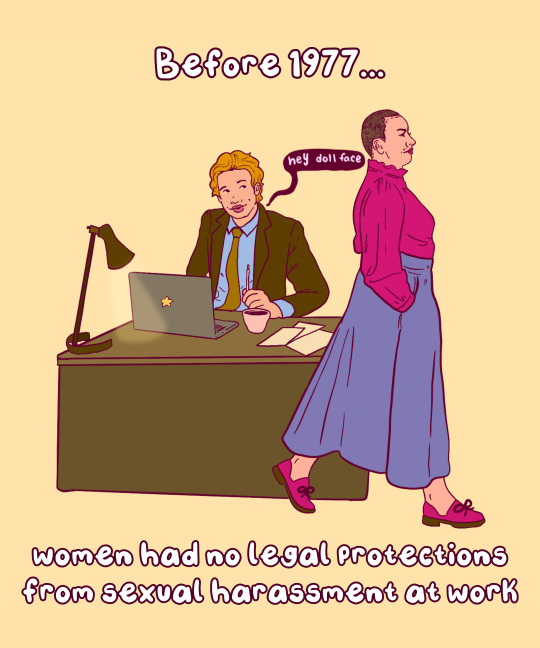
📍 Before 1977, sexual harassment was not considered a legal offense. That changed when a woman brought her boss to court after she refused his sexual advances and was fired. The court stated that her termination violated the 1974 Civil Rights Act, which made employment discrimination illegal.⚖️
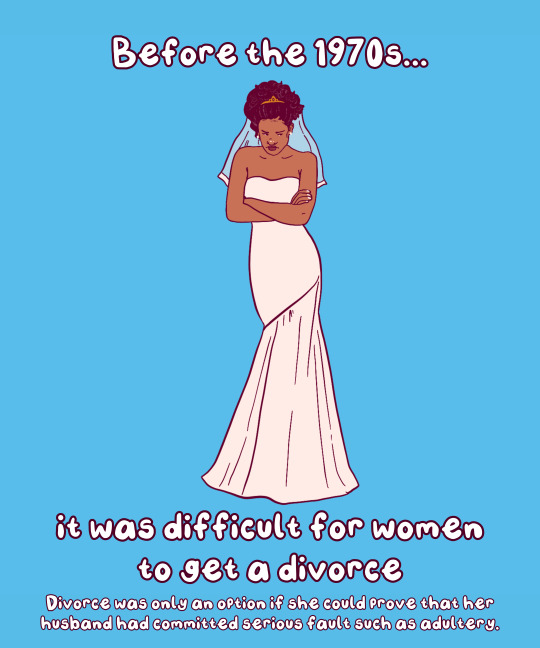
📍 In 1969, California became the first state to pass legislation to allow no-fault divorce. Before then, divorce could only be obtained if a woman could prove that her husband had committed serious faults such as adultery. 💍By 1977, nine states had adopted no-fault divorce laws, and by late 1983, every state had but two. The last, New York, adopted a law in 2010.
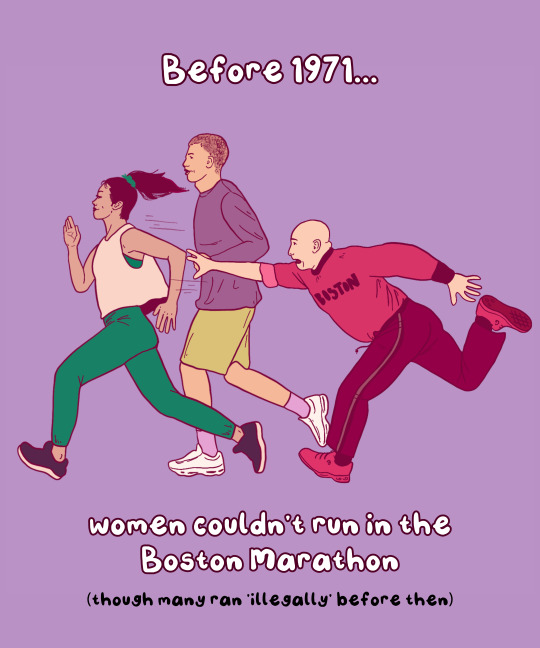
📍In 1967, Kathrine Switzer, entered the Boston Marathon under the name "K.V. Switzer." At the time, the Amateur Athletics Union didn't allow women. Once discovered, staff tried to remove Switzer from the race, but she finished. AAU did not formally accept women until fall 1971.

📍 In 1972, Lillian Garland, a receptionist at a California bank, went on unpaid leave to have a baby and when she returned, her position was filled. Her lawsuit led to 1978's Pregnancy Discrimination Act, which found that discriminating against pregnant people is unlawful
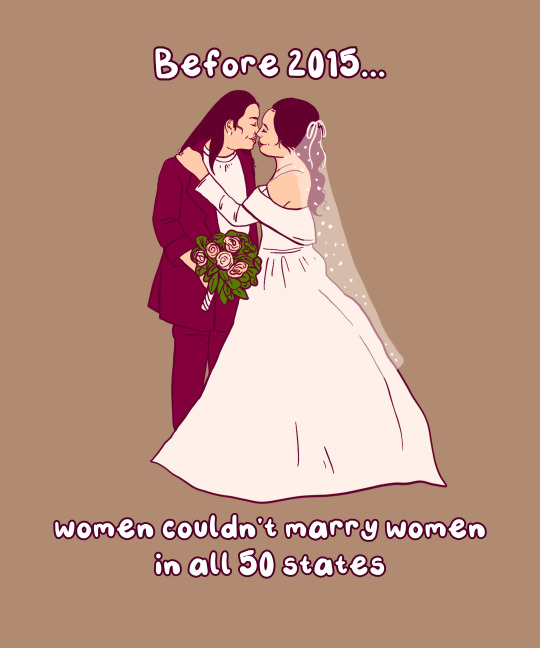
📍 It wasn’t until 2016 that gay marriage was legal in all 50 states. Previously, laws varied by state, and while many states allowed for civil unions for same-sex couples, it created a separate but equal standard. In 2008, California was the first state to achieve marriage equality, only to reverse that right following a ballot initiative later that year.

📍In 2018, Utah and Idaho were the last two states that lacked clear legislation protecting chest or breast feeding parents from obscenity laws. At the time, an Idaho congressman complained women would, "whip it out and do it anywhere,"
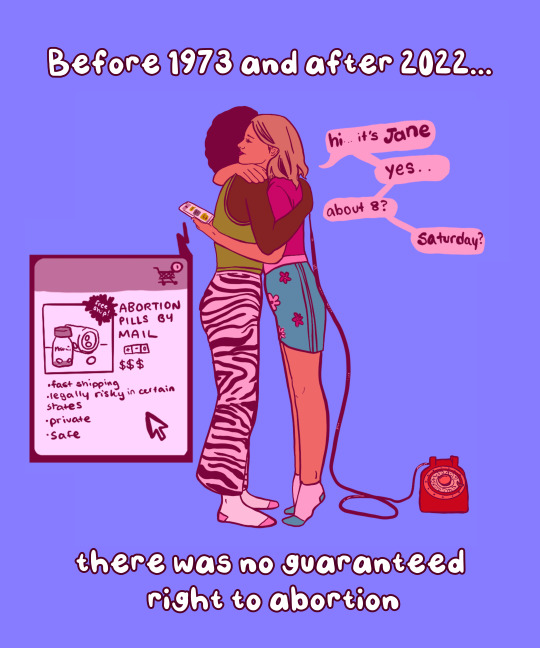
📍 In 1973, the Supreme Court affirmed the right to safe legal abortion in Roe v. Wade. At the time of the decision, nearly all states outlawed abortion with few exceptions. In 1965, illegal abortions made up one-sixth of all pregnancy- and childbirth-related deaths. Unfortunately after years of abortion restrictions and bans, the Supreme Court overturned Roe in 2022. Since then, 14 states have fully banned care, and another 7 severely restrict it – leaving most of the south and midwest without access.
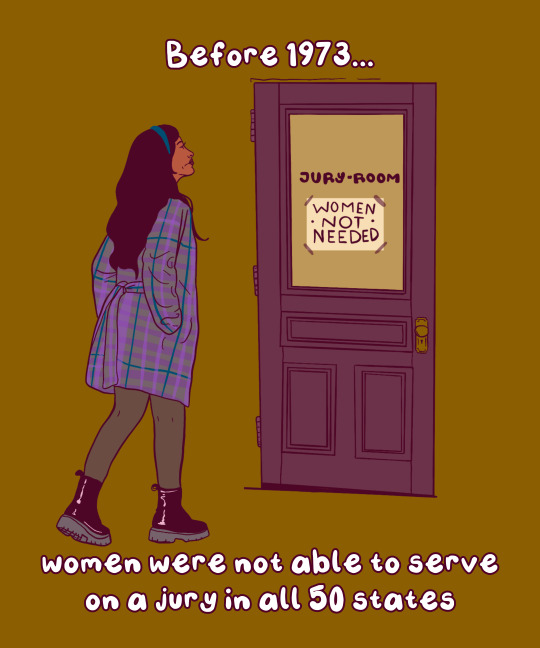
📍 Before 1973, women were not able to serve on a jury in all 50 states. However, this varied by state: Utah was the first state to allow women to serve jury duty in 1898. Though, by 1927, only 19 states allowed women to serve jury duty. The Civil Rights Act of 1957 gave women the right to serve on federal juries, though it wasn't until 1973 that all 50 states passed similar legislation

📍 Before 1988, women were unable to get a business loan on their own. The Women's Business Ownership Act of 1988 allowed women to get loans without a male co-signer and removed other barriers to women in business. The number of women-owned businesses increased by 31 times in the last four decades.
Free download
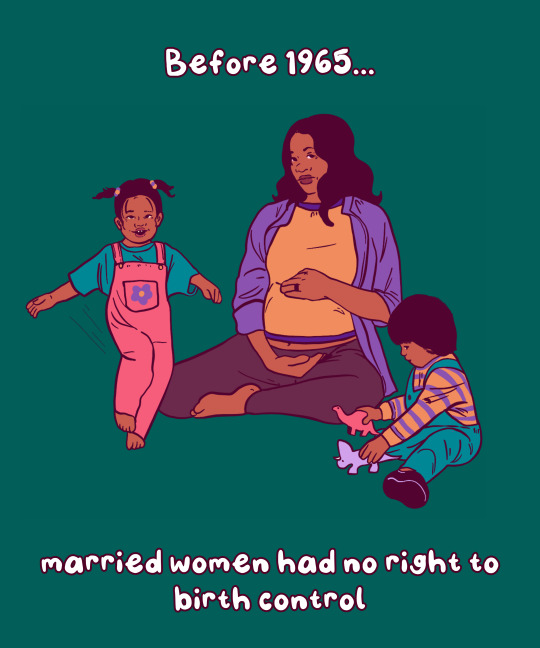
📍 Before 1965, married women had no right to birth control. In Griswold v. Connecticut (1965), the Supreme Court ruled that banning the use of contraceptives violated the right to marital privacy.
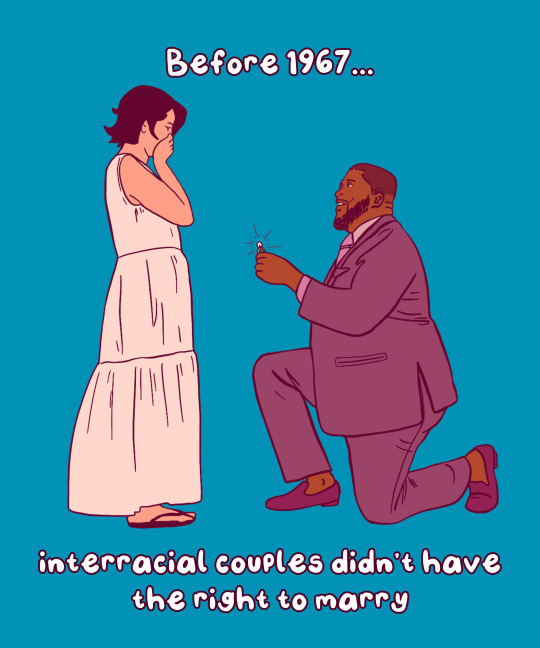
📍 Before 1967, interracial couples didn’t have the right to marry. In Loving v. Virginia, the Supreme Court found that anti-miscegenation laws were unconstitutional. In 2000, Alabama was the last State to remove its anti-miscegenation laws from the books.

📍 Before 1972, unmarried women didn’t have the right to birth control. While married couples gained the right in 1967, it wasn’t until Eisenstadt v. Baird seven years later, that the Supreme Court affirmed the right to contraception for unmarried people.
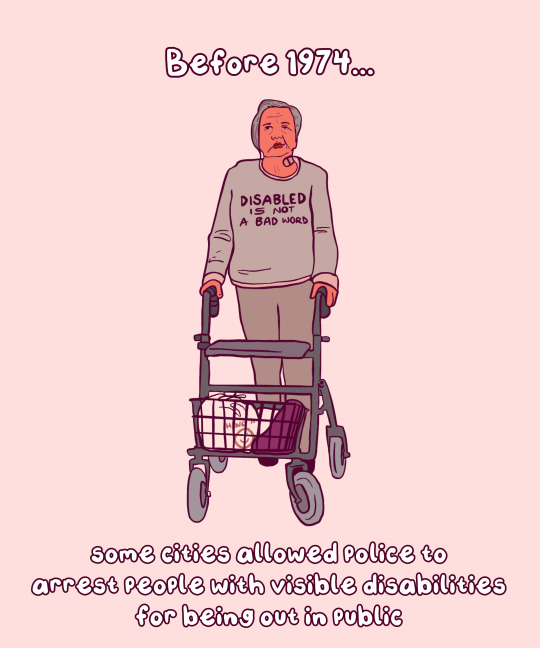
📍 In 1974, the last “Ugly Laws” were repealed in Chicago. “Ugly Laws” allowed the police to arrest and jail people with visible disabilities for being seen in public. People charged with ugly laws were either charged a fine or held in jail. ‘Ugly Laws’ were a part of the late 19th century Victorian Era poor laws.

📍 In 1976, Hawaii was the last state to lift requirements that a woman take her husband’s last name. If a woman didn’t take her husband’s last name, employers could refuse to issue her payroll and she could be barred from voting.

📍 It wasn’t until 1993 that marital assault became a crime in all 50 states. Historically, intercourse within marriage was regarded as a “right” of spouses. Before 1974, in all fifty U.S. states, men had legal immunity for assaults their wives. Oklahoma and North Carolina were the last to change the law in 1993.
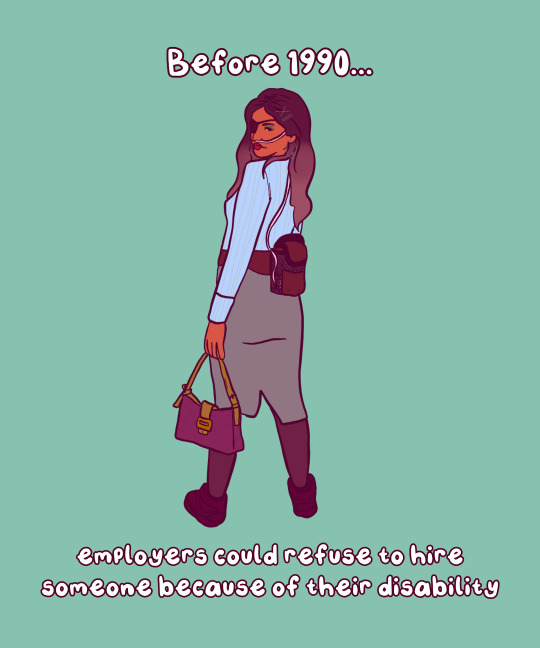
📍 In 1990, the Americans with Disability Act (ADA) – most comprehensive disability rights legislation in U.S. history – was passed. The ADA protected disabled people from employment discrimination. Previously, an employer could refuse to hire someone just because of their disability.
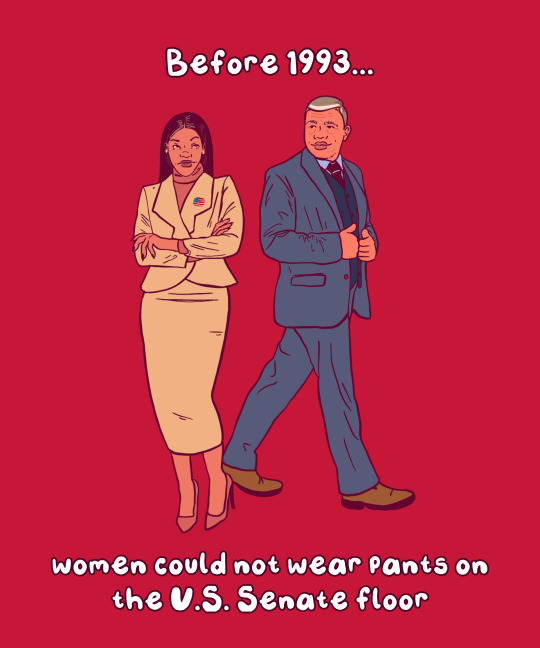
📍 Before 1993, women weren’t allowed to wear pants on the Senate floor. That changed when Sen. Moseley Braun (D-IL), & Sen. Barbara Mikulski (D-MD) wore trousers - shocking the male-dominated Senate. Their fashion statement ultimately led to the dress code being clarified to allow women to wear pants.

📍 Emergency contraception (Plan B) wasn't approved by the FDA until 1998. While many can get emergency contraception at their local drugstore, back then it required a prescription. In 2013, the FDA removed age limits & allowed retailers to stock it directly on the shelf (although many don’t).
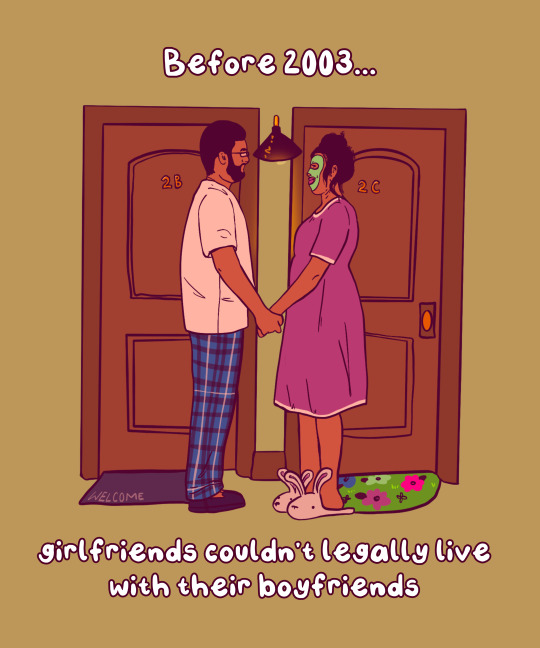
📍 In Lawrence v. Texas (2003), the Supreme Court ruled that anti-cohabitation laws were unconstitutional. Sometimes referred to as the ‘'Living in Sin' statute, anti-cohabitation laws criminalize living with a partner if the couple is unmarried. Today, Mississippi still has laws on its books against cohabitation.
#art#feminism#women's history#women's history month#iwd2024#international women's day#herstory#educational#graphics#history#70s#80s#rights#women's rights#human rights
14K notes
·
View notes
Text
Woman: Adult Human Female.
https://archive.ph/2023.11.01-142554/https://www.thenational.scot/news/23894878.women-scotland-lose-court-session-appeal-woman-definition/
FOR Women Scotland (FWS) has lost an appeal in the Court of Session over the legal definition of a woman.
The group had challenged a ruling that transgender women with a Gender Recognition Certificate (GRC) can legally be defined as women.
In a written ruling, Lady Dorrian, the Lord Justice Clerk, set out that a person “with a GRC in the female gender” is defined as a woman under the Equality Act (EA) 2010.
The appeal was brought after the Gender Critical group lost an initial case on the definition of a woman in legislation that aims to ensure gender balance on public boards.
Lady Haldane has previously ruled, after FWS requested a second judicial review of the Gender Representation on Public Boards (Scotland), that the meaning of sex is “not limited to biological or birth sex” but includes those in possession of a GRC.
In a further written judgment, released on Wednesday, Dorrian ruled that guidance under the UK legislation the Gender Recognition Act 2004, “does not conflate” two separate protected characteristics.
“A person with a GRC in their acquired gender possesses the protected characteristic of gender reassignment for the purposes of section 7 EA,” Dorrian (below) wrote in her conclusion.
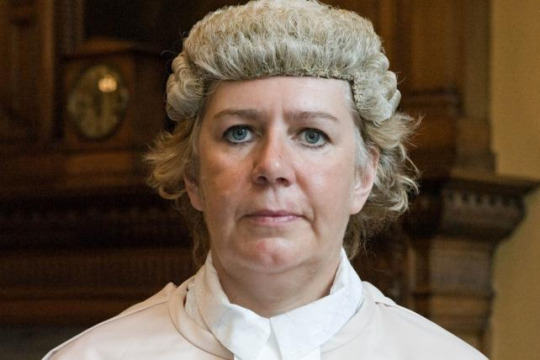
"Separately, for the purposes of section 11 they also possess the protected characteristic of sex according to the terms of their GRC.
“For the purposes of section 11, individuals without a GRC, whether they have the protected characteristic of gender reassignment or not, retain the sex in which they were born.”
Dorrian added that “no conflation” of protected characteristics is involved.
“A person with a GRC in the female gender comes within the definition of “woman” for the purposes of section 11 of the EA, and the guidance issued in respect of the 2018 Act is lawful,” she added.
“The reclaiming motion is refused.”
FWS said in a statement they were “hugely disappointed” in the ruling.
“We are obviously still analysing the decision and will be speaking to our legal team in due course to consider the possibility of a further challenge,” they added.
We previously told how the gender representation legislation intends to ensure that non-executive members on public boards are made up of at least 50% women.
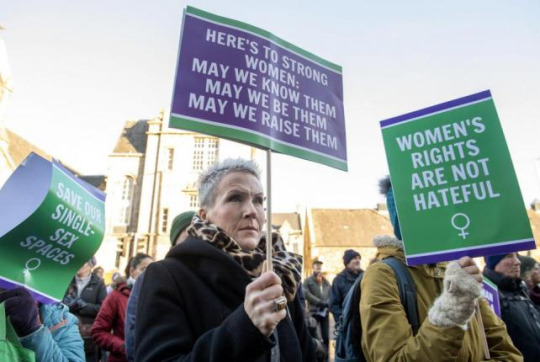
Scottish ministers had argued that those who were living as a woman or had gone through the GRC process could be defined as a woman within the legislation.
FWS argued that this did not accord with the separate definitions of women and transgender women under the Equality Act 2010 and voiced concerns about implications for single-sex spaces.
The group lost the initial judicial review in 2021, but were successful on appeal. The Scottish Government then revised the legislation, which now states that the definition of “woman” is defined by the Equality Act 2010 and the Gender Recognition Act 2004.
This meant that transgender women with a GRC would be considered women under the bill.
This led to FWS calling for a second judicial review, where Haldane ruled in favour of the Scottish Government.
This led to another appeal, which Dorrian ruled against on Wednesday.
#For Women Scotland (FWS)#Gender Recognition Certificate (GRC)#Equality Act (EA) 2010#Governments didn't need to argue over the definition woman 100 years ago
3 notes
·
View notes
Video
youtube
Council (Liverpool City Council) 22nd November 2023 Part 4 of 4
#youtube#Liverpool City Council#Liverpool Town Hall#Liverpool#councillors#Council#Put an End to Litterpool#Reaffirmation of Liverpool City Council's commitment#the voluntary use of Section 1 of the Equality Act (2010) to tackle socio economic inequality#Protecting the public from dangerous dogs
0 notes
Text
So the Equality and Human Rights Commission in the UK has suggested that the UK Government should define sex in the Equality Act of 2010 as biological sex. If the Government goes ahead with this, which knowing the UK Government at present they likely will this will drastically gut trans rights in the UK and make Gender Recognition Certificates pretty much meaningless.
It would actually probably make a GRC impossible to acquire as doctors require you to use the facilities of your gender before they will even support you getting a Gender Recognition Certificate.
3 notes
·
View notes
Text
Mental Health Awareness blog video 1
by
Ryan Clement
TODAY’s blog is unusual. I say this because it is not so much a blog in the ordinary sense but one that does little more than introduce my latest video. I would not normally use this platform for a video premier, but there is a link. This video is the visual form of the first three of six blogs I wrote for Mental Health Awareness Week 2023, which were so well received, I was…

View On WordPress
0 notes
Text
I don't care what nationality you are. US, UK, French, German, anyone in Europe, please do me the grandest of favours and spread this around. Steal the link, make your own post, I don't care; just get it to the eyes of your viewers because if they're Canadian, I need your help.
This petition ends May 26th 2023:
What is this about?
"Whereas:
The world is becoming increasingly hostile to transgender and nonbinary individuals;
Transgender and nonbinary people's rights to live as themselves are being restricted and removed in many places;
This includes the so-called "Western democracies" which have historically been presumed safe;
More than a dozen American states have enacted or are considering legislation eliminating or criminalizing gender-affirming care; and
Canada has prided itself on being an inclusive, tolerant, and welcoming society for everyone regardless of gender identity or gender expression.
We, the undersigned, residents of Canada, call upon the House of Commons to extend to transgender and nonbinary people the right to claim asylum in Canada by reason of eliminationist laws in their home countries, whatever country that may be."
It's better to give people an exit plan, and just hope they won't need it, then to do nothing and assume they'll be fine. Help us keep making Canada a positive place for everyone. I hope you'll sign if you're Canadian, and if you're not, I hope you'll help us make some positivity by sharing this around.
(Edit: A bullet point in the petitions description has been removed from this post, but remains on the petition. It's removal is due to misinformation around the UK's Equality Act 2010 only providing protection for those seeking sexual reassignment surgery. And while the Equality Act 2010 does explicitly state this, the Equality and Human Rights Commission has released an Equality Act 2019 Code of Practice document that specifies all transgender people are protected under the protected characteristic of "gender reassignment" regardless of desire to undergo the specific surgery initially identified in the Equality Act 2010 document. There has been, as of this editation, no direct quote or statement of plans to remove these protections from discrimination to the public.
I'd also like to add that there do exist protections already for 2SLGBTQIA+ folk to seek asylum in Canada, and the MP who made this petition has apparently been made aware of this, however, due to certain restrictions on that act, Canada currently lists the US as a safe country for 2SLGBTQIA+ folk because as long as there is one safe place(state, province, or territory) in the country for queer folk, the ability to seek asylum is denied. This petition clearly states a need to make a more specific clarification regarding this and open up assylum if any discriminatory laws pop up at all within a country, no matter if it's regional laws, or country wide. Specifying this because there's been a reblog or two calling this petition pointless and because I'm already clarifying UK law misinformation, might as well tackle misinformation from my own country as well. ♡)
13K notes
·
View notes